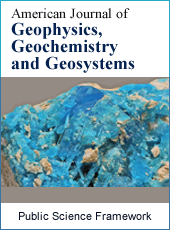American Journal of Geophysics, Geochemistry and Geosystems
Articles Information
American Journal of Geophysics, Geochemistry and Geosystems, Vol.6, No.1, Mar. 2020, Pub. Date: Apr. 30, 2020
Application of Gas Ratio Analysis in Reservoir Evaluation – Case Study in Belayim Land Field, Gulf of Suez, Egypt
Pages: 16-25 Views: 2342 Downloads: 5293
[01]
Mazen El Bay, P. Services Gmbh Middle East, Cairo, Egypt.
Knowledge of gas analysis from the extracted drilling formation represents the earliest data while drilling and is performed by mud logging contractors which represent an important stage into the formation evaluation by the wellsite geologists and represent an important stage for the production team especially in exploratory drilling operations. In this paper, we will study Gas Ratio Analysis which can play a role to identify the fluid types and decide which layers have hydrocarbons by using simple ratios of light gases measured by gas chromatograph inside the mud logging unit where it can be calculated in real-time and plotted, both on mud logs together with depth-based data. In this study we selected three wells in belayim land field to application of gas ratio analysis, It was shown that hydrocarbon distributions inside the formation where we can select the best places for perforation and production.
Gas Analysis, Real-Time, Gas Ratio
[01]
Al Sharhan, A (2003): "Petroleum geology and potential Hydrocarbon plays in the Gulf of Suez Rift Basin". AAPG Bulletin, V. 87, Paper no. 1, pp. 143-180.
[02]
D. Kandel SPE, Total Fina Elf: R. Quagliaroli, SPE, ENI Agip Div. G. Segalini, Total Fina Elf, B. Barraud, Total Fina Elf, ―Improved integrated Reservoir interpretation using the Gas While Drilling (GWD) data. SPE European Petroleum Conference Paris October 2000.
[03]
Breviere, J., Herzaft, B. and Mueller, N. (2002) Gas Chromato-graphy mass spectrometry (GCMS): A new wellsite tool for continuous C1-C8 gas measurement in Drilling mud including original Gas Extractor and Gas line concepts. 43rd Annual Logging Symp. Soc. Prof. Well Log Analysis (SPWLA), p. 48.
[04]
David P. Hawker. (1999): "Hydrocarbon Evaluation and Interpretation". Datalog, Calgary, Alberta, Canada.
[05]
El Diasty, W. Sh. and K. E. Peters (2014): "Genetic classification of oil families in the central and southern sectors of the Gulf of Suez, Egypt, Journal of Petroleum Geology, Vol. 37 (2), April 2014, pp 105-126.
[06]
Egyptian General Petroleum Corporation "EGPC". (1996): "Gulf of Suez Oil and Gas Fields, (A Comprehensive Overview), Cairo, Egypt, 270 p.
[07]
Ellis, L., Brown, A., Schoell, M. and Uchytil, S. (2003) Mud gas Isotope Logging (MGIL) assists in Oil and Gas Drilling Operations. Oil and Gas Jour., v. 101, no. 21, pp. 32-41.
[08]
Estimation of Gas/Oil Ratios and Detection of Unusual Formation Fluids from Mud Logging Gas Data, Alan C. Wright, Texaco EPTD, SPWLA 37th Annual Logging Symposium, June 16-[9]- Ferroni G., Uncertainties in Hydrocarbon Detection While Drilling: what does reliable really mean, 2013, SPWLA Abu Dhabi Topical Conference, Abu Dhabi, United Arab Emirates. 19, 1996.
[09]
Ferroni G., Uncertainties in Hydrocarbon Detection While Drilling: what does reliable really mean, 2013, SPWLA Abu Dhabi Topical Conference, Abu Dhabi, United Arab Emirates. 19, 1996.
[10]
Moustafa, A. R. (2002): "Control on the geometry of transfer zones in the Suez rift and northwest Red Sea: Implications for the structural geometry of rift systems". American Association of Petroleum Geologist Bulletin, 86, 979-1002.
[11]
Reservoir Characterization by Analysis of Light Hydrocarbon Shows, J. H. Haworth, M. P. Sellens, R. L. Gurvis, SPE 12914, 1984.
[12]
Talwani, M., 2002, The Orinoco heavy oil belt in Venezuela, accessed 12 February 2009.
[13]
Yan Song, Zhuo Li, Lin Jiang, Feng Hong (13 October 2015) - The concept and the accumulation characteristics of unconventional hydrocarbon resources, Pet. Sci., Springer.
[14]
Zalat, A. A. (2001): "Miocene Stratigraphy in the Nile Delta and Gulf of Suez", Comparative studies. An Article Review.

ISSN Print: 2381-7143
ISSN Online: 2381-7151
Current Issue:
Vol. 7, Issue 3, September Submit a Manuscript Join Editorial Board Join Reviewer Team
ISSN Online: 2381-7151
Current Issue:
Vol. 7, Issue 3, September Submit a Manuscript Join Editorial Board Join Reviewer Team
| About This Journal |
| All Issues |
| Open Access |
| Indexing |
| Payment Information |
| Author Guidelines |
| Review Process |
| Publication Ethics |
| Editorial Board |
| Peer Reviewers |


